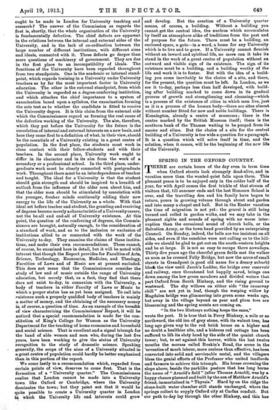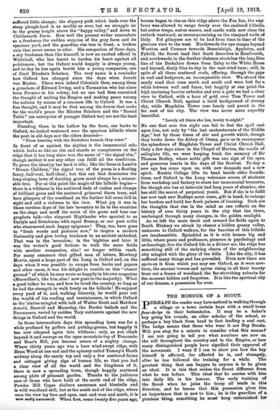SPRING IN THE OXFORD COUNTRY.
THERE are certain hours of the day even in term time when Oxford streets look strangely dead-alive, and in vacation more than the wonted quiet falls upon them. This pleasant peace is to be enjoyed only in the colder half of the year, for with April comes the first trickle of that stream of visitors that, till summer ends and the last Honours School is over, and the travelling don and his family have begun to return, pours in growing volume through street and garden and into many a chapel and ball. But in the Easter vacation the time of migration is not yet : the gravel is still being turned and rolled in garden walks, and we may take in the pleasant sights and sounds of spring with no worse inter- ruption than the occasional sound of church bells, or the Salvation Array, or the town band provided by an enterprising Council. On Sunday, indeed, the bells are too insistent on all sides, and even if the sunshine were not calling us to the hill- side we should be glad to get out on the south-western heights and be at large. It is not so easy to escape there nowadays. Thirty-five years ago the cheerful green fields met the walker as soon as he crossed Folly Bridge, but now the acres of small streets in Grandpont (a good old name for a dreary suburb) block the view until Jacob's Ladder, the bridge over reservoir and railway, once threatened but happily saved, brings one down among the low green meadows and divided waters that part Oxford from South Hinksey, and the rising ground to westward. The shy willows on either side "the causeway chill" are not yet in leaf, though the weeping willow by Magdalen bridge was glimmering into green some weeks ago, but away in the village beyond us pear and plum tree are blossoming and the spring scents are coming on.
"In the two Hinkseys nothing keeps the same,"
wrote the poet. It is true that in Ferry Hinksey, a mile or so northward, the old inn of grey stone, with its walnut tree, has long ago given way to the red brick house on a higher and no doubt a healthier site, and a hideous red cottage has been suffered to lift its slaty head by the side of the quaint church tower ; but, to set against this horror, within the last twelve months the morass called Ruskin's Road, the scene in the 'seventies of much labour, more zealous than effective, has been converted into solid and serviceable metal, and the villagers bless the genial efforts of the Professor who united landlords and farmers to achieve this triumph. His house crowning the slope above, beside the parklike pasture that has long borne the name of "Arnold's field" (after Thomas Arnold), was by a happy chance planned and built by the son of Matthew Arnold's friend, immortalized in " Thyrsis." Hard by on the ridge the stone-built water chamber still stands unchanged, where the springs collect to supply Oxford city at Cat-fax conduit. But our path to-day lay through the other Hinksey, and this has
suffered little change; the slippery path which leads over the steep plough-land is as muddy as ever, but we struggle on to the grassy height above the "happy valley," and down to Childsworth Farm. How well the present writer remembers as a freshman the sudden surprise of the grey farm and its spacious yard, and the guardian elm tree in front, a broken ruin that never seems to alter. His companion of those days, a shy freshman then like himself, is now an exalted official in Whitehall, who has learnt to harden his heart against all petitioners; but the Oxford world happily is always young, and to-day he has again beside him a young companion, one of Cecil Rhodes's Scholars. The very name is a reminder how Oxford has changed since the days when Jowett was Master. There were indeed Colonials then, among them a grandson of Edward Irving, and a Tasmanian who has since been Premier in his colony, but no one had then conceived the thought of uniting the Empire and making peace among the nations by means of a common life in Oxford. It was a fine thought, and it may be that among the forces that make for the world's peace the Rhodes Scholars and the "Round Table" (an enterprise of younger Oxford too) are not the least important.
Standing there in the hollow by the farm, our backs to Oxford, we looked westward over the spacious hillside where the poet in old days saw the riders descend-
" From hunting with the Berkshire hounds they come."
In front of us against the skyline is the immemorial oak, which looks so like an elm and stands so conspicuous on the ridge that it has long since won the name of "the signal elm," though neither it nor any other can fulfil all the conditions. To press the identity too hard is idle; like the faces in Lamb's "Dream Children," the signal tree of the poem is a floating fancy, half-real, half-ideal ; but this oak that dominates the long-sloping lawn of dazzling green must always be a memor- able tree. For at this point the magic of the hillside begins— there is a wildness in the scattered beds of rushes and clumps of brilliant gorse and the scattered primeval thorn trees, and here glimpses of the woodland on the further hill come full in sight and add a richness to the view. What joy it was in those careless days of the late 'seventies to lie in the sunshine on the slope and snuff the scent of the gorse and bear our prophets talk—the eloquent Highlander who spouted to us Carlyle and Swinburne with equal fluency, or our poet critic who stammered such happy epigrams ! They, too, have gone to "fresh woods and pastures new," to inspire a modern University and give loving tendance to an ancient cathedral. That was in the 'seventies; in the 'eighties and later it was the writer's good fortune to walk the same fields with another companion, alas! no longer within reach. For many summers that gifted man of letters, Mowbray Morris, spent a large part of the Long in Oxford and, on the days when it was possible to escape from books and papers and other cares, it was his delight to ramble on this "classic ground" of which he once wrote so happily in his own magazine (Macmillan's, like him, alas ! now gone to the majority). What a good talker he was, and how he loved the country, so long as he had the strength to walk freely on the hillside! He enjoyed every yard of it, and, walking leisurely, he would pour out the wealth of his reading and reminiscence, in which Oxford in the 'sixties mingled with talk of Walter Scott and Matthew Arnold, Boswell and Macaulay, the Border ballads and the Buccaneers, varied by sudden Tory outbursts against the new things in Oxford and the world.
In those intermediate days this spreading lawn was for a while profaned by golfers and putting-greens, but happily it has now relapsed again into wildness; only, as you climb beyond it and emerge on the open mountain-top of Foxcombe and Boar's Hill, you become aware of a mighty change. Where thirty years ago was a bare wind-swept ridge, with Henn Wood at one end and the spinney called Tommy's Heath midway along the sandy top and only a few scattered farms and cottages giving sign of human life, so that you had a clear view of all the world and the kingdoms of it, there is now a spreading town, though happily scattered among plots of pleasant garden. Thanks to the judicious care of those who have built at the north end of the ridge, Powder Hill Copse shelters anemones and bluebells and is wild woodland still, but at the south end of the ridge, where once the view lay free and open, east and west and south, it is now sadly narrowed. When first, some twenty-five years ago,
houses began to rise on this ridge above the Fox Inn, the way. farer was allowed to range freely over the enclosed hillside, but autres temps, autres mceurs, and castle walls now close the outlook westward, as uncompromising as the vineyard walls of Italy. Yet glimpses are to be bad from time to time of the glorious view to the west. Northwards the eye ranges beyond Wootton and Cumnor towards Besselsleigh, Appleton, and Fyfield, the forest land that Scott describes in Kenilworth, and southwards in the further distance stretches the long blue line of the Berkshire downs from Ilsley to the White Horse and beyond, dimly blue to-day in the east-wind haze ; still, in spite of all these scattered roofs, offering, through the gaps in wall and hedgerow, an incomparable view. We struck the sandy road that runs north and south and were lost for a while between wall and fence, but happily at one point the high enclosing barrier subsides and over a gate we bad a clear view to Oxford, with a haze of gold over Tom Tower and Christ Church Hall, against a lurid background of stormy sky, while Magdalen Tower rose lonely and proud in the far east of the city. The view was never more superbly beautiful.
"Lovely all times she lies, lovely to-night."
No one that sees this sight can fail to feel the spell cast upon him, not only by "the last enchantments of the Middle Age," but by those times of stir and growth which, though they broke down the Abbey of Osney, gave us in recompense the splendours of Magdalen Tower and Christ Church Hall.
Only a few days since in the Chapel of Merton, the cradle of collegiate life, we were keeping fresh the memory of Sir Thomas Bodley, whose noble gift was one sign of the open and generous hearts in the days of the Revival. To-day a.
new age has come upon us, with new demands and a new spirit. Ruskin College lifts its head beside older founda- tions, and Oxford in the Long welcomes scores of students from workshop and factory to share her immemorial treasures, for though she has at intervals bad long years of slumber, she has still the secret of perpetual youth. But if she is to fulfil her new task new Bodleys must come, gift in hand, to enlarge her borders and build her fresh palaces of learning. Such are the thoughts that rise in the mind as one reflects on the history of over thirty years in the city that lies there, unchanged through many changes, in the golden sunlight.
As we left the main track and crossed the fields again to South Hinksey we struck by chance a hidden grassy valley, unknown to Oxford walkers, for the beauties of this hillside are inexhaustible. Sprinkled as it is with houses big and little, where poets and professors, pioneers in psychology and archaeology, live the Oxford life hi a diviner air, the ridge has something still of the undying charm of the neighbouring city mingled with the glory of the bills. Like the city, it has suffered many things and has prevailed. Even now there are spots on it from which you may see Oxford, as it were new- born, the ancient towers and spires rising in all their beauty from out a frame of woodland, the far-stretching suburbs for the moment hidden and forgotten. It is like the spiritual city of our dreams, a possession for ever.











































 Previous page
Previous page